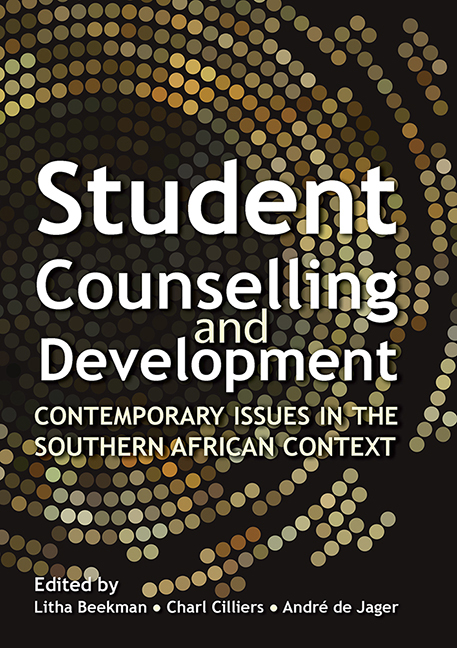Book contents
- Frontmatter
- Contents
- Figures
- Tables
- Preface
- Section 1 Development of Student Counselling and Development in Southern Africa
- Section 2 Theoretical Foundations of Student Counselling and Development in Higher Education
- Section 3 Services and Programmes Provided by Student Counselling and Development Units
- Section 4 Student Counselling and Development For Special Groups
- Section 5 Quality Assurance and Ethical and Professional Issues
- Contributors
- Index
Chapter 6 - Wellness: A Model For Holistic Student Development
Published online by Cambridge University Press: 22 February 2020
- Frontmatter
- Contents
- Figures
- Tables
- Preface
- Section 1 Development of Student Counselling and Development in Southern Africa
- Section 2 Theoretical Foundations of Student Counselling and Development in Higher Education
- Section 3 Services and Programmes Provided by Student Counselling and Development Units
- Section 4 Student Counselling and Development For Special Groups
- Section 5 Quality Assurance and Ethical and Professional Issues
- Contributors
- Index
Summary
INTRODUCTION
Wellness has become a popular buzzword in South Africa during the last decade, in higher education (HE) and beyond. Theory and research-based wellness programmes, training courses and conferences exist alongside marketing ploys for slimming and beauty products, and even dog food. While wellness - in terms of wellness programming for both students and employees - has found a firm footing in South African HE during the past decade, it is fitting that a book section on theoretical foundations for Student Counselling and Development (SCD) would include a chapter on wellness.
The first section of the chapter provides a brief history of the wellness movement. Thereafter, the rationale for using a wellness approach is provided. The wellness concept is explored with reference to several definitions and descriptions, followed by research-based evidence, and a brief overview of wellness models and dimensions with reference to five prominent wellness models. The next section suggests a wellness model relevant to the South African HE context. The last section focuses on the practical application of wellness within the SCD context.
BRIEF HISTORY OF THE WELLNESS MOVEMENT
Dunn was the first to use the term “wellness” during the late 1950s, and the first known publication of the term occurred in the early 1960s (Dunn, 1961). Dunn's focus was on the maximisation of human potential rather than the absence of illness. He furthermore emphasised a holistic approach to wellness, focusing on the interrelated and interdependent nature of the mind, body and spirit. While the term was newly coined during the late 1950s and early 1960s the concept of wellness is seen to have existed for centuries, as the ancient Greek view of a healthy person was one who possessed “a keen intellect, a well-developed will, and a disciplined body” (Johnson & Wernig, 1986, p. 33). Furthermore, the merging of the body, mind and spirit was seen to be a noble and ideal state of human functioning (Archer, Probert & Gage, 1987). The World Health Organization's (WHO) definition of health - formulated in 1948, and not amended since then - bears a similar message: “Health is a state of complete physical, mental, and social well-being and not merely the absence of disease or infirmity” (WHO, 2009).
- Type
- Chapter
- Information
- Student Counselling and DevelopmentContemporary issuesin the Southern African Context, pp. 106 - 128Publisher: University of South AfricaPrint publication year: 2012
- 1
- Cited by



